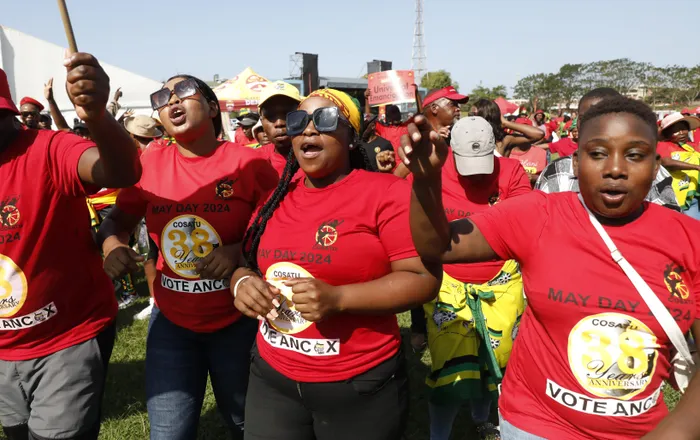Honouring Durban’s legacy in the Workers' Rights Revolution
Workers' Day is a solemn commemoration of the sacrifices made by countless individuals who resisted exploitation

Cosatu members at the May Day rally in Durban last year. The exhibits at the KwaMuhle Museum in Durban are a powerful tribute to the struggles and triumphs of workers, particularly Black workers, under apartheid, the writer says. Picture: Doctor Ngcobo Independent Newspapers
Image: Doctor Ngcobo Independent Newspapers
On this May Day, we pause to honour the long and difficult journey of South African workers. This journey was never just about wages — it was a revolution to dismantle the apartheid system and its oppressive and unjust workplace laws. This history resonates deeply with the legacy preserved at our very own KwaMuhle Museum.
The museum stands as a powerful tribute to the struggles and triumphs of workers, particularly Black workers, under apartheid. Its exhibits vividly document the brutal realities of the migrant labour system, the dehumanising pass laws, and the tireless fight for basic human and labour rights.
That is why Worker's Day holds such deep significance. It is not merely a public holiday; it is a solemn commemoration of the sacrifices made by countless individuals who resisted exploitation and fought for fair treatment. At its heart, it was a struggle for dignity, fairness, justice, and freedom.
The echoes of their courage still reverberate through the walls of the KwaMuhle Museum, reminding us of the long, painful road toward labour justice in South Africa. Durban holds a special place in this journey. In January 1973, more than 100 000 workers rose up in a wave of strikes to demand an end to exploitative labour practices.
Their bravery marked a turning point, a powerful voice against oppression that rippled across the nation and forced even the most repressive forces of apartheid to take notice.
The Durban strikes ushered in a new era of independent Black trade unionism, ultimately laying the foundation for the formation of the Congress of South African Trade Unions (COSATU) in 1985. Today, workers enjoy rights enshrined in the Constitution, our nation’s supreme law, and are protected through legislation such as the Labour Relations Act and the Basic Conditions of Employment Act.
These victories were hard-won. And yet, while democracy delivered many gains, the struggle for justice in the workplace continues. In eThekwini Municipality, we remain committed to safeguarding these gains. We promote fair employment practices, upholding workers’ rights, and supporting strong collective bargaining systems.
Our progress is guided by eThekwini Municipality’s Vision 2030 and is aligned with the Sustainable Development Goals. We are deliberate about putting people first and creating environments where every worker can thrive. These values are part of the legacy we inherited from those who marched through our streets and faced oppression with unity and courage.
Let us honour the brave workers of 1973 by defending the rights they fought for and building a future where every worker is treated with dignity and respect. Let us stand firm against the casualisation of labour, mass retrenchments, and the erosion of organised labour.
In the pursuit of profit, too many have forgotten the value of people. When we ignore the sacrifices of those who came before us, we risk losing the freedom they secured. We must remember the warning passed down through generations: “Men fight for liberty and win it with hard knocks. Their children, brought up easy, let it slip away again, poor fools. And their grandchildren are once more slaves.”
As celebrations unfold across the country, it is vital that we centre the unique struggles of workers in this region. KwaMuhle is not just a museum, it is an anchor that grounds the broader Workers’ Day narrative in the lived experiences of those who toiled under immense hardship.
It challenges us to honour the progress made while remaining vigilant in confronting modern labour challenges. We must ensure that the rights, dignity, and voices of all workers are protected.
The ANC’s 54th National Conference set us on a path of radical economic transformation. We are called to consider bold and unorthodox solutions to revive our economy. This transformation is not a populist slogan, it is a call to face the hard truths about our country's economic reality.
Renewing the alliance and society is central to our collective future. This May Day, let us recommit to vigilance, unity, and justice. The struggle is far from over — and neither is our resolve.
| Councillor Madlala is the ANC eThekwini Deputy Regional Secretary, chairperson of the City's Governance and Human Capital Committee, and ANC Whip of the Executive. He writes in his personal capacity.
Related Topics:
